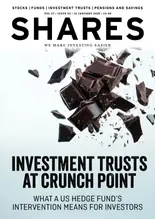
Christmas retail trading results continue to flood in during trading on Thursday, with Marks & Spencer (MKS) showing a sales decline and growth at Tesco (TSCO) that still misses forecasts.
Tesco, Britain’s largest supermarket chain, reports a 1.9% rise in like-for-like sales in its home market for the Christmas period. But that falls short of market expectations after strong growth in fresh food was offset by lower demand for general merchandise.
Tesco shares take the fall, heading the FTSE 100 index loser board on Thursday with a near-4% slide to 203.9p. Investors remain concerned about the savagery of competition in the UK supermarket space, not just among the big four operators, but from German discounter pair Lidl and Aldi.
THREE IN A ROW FOR M&S
Also sinking today are shares in Marks ‘n’ Sparks, down 2.5% at 316p in early trade. While the high street doyen posts a slightly better-than-expected decline in clothing and homeware sales in its third quarter - which includes the vital Christmas period - this represents its third straight three month period of falling sales.
Particularly disappointing is the 0.4% decline in food sales, an area where M&S has previously performed well. Investors may take some consolation from guidance for the rest of the year to end March, which remains unchanged in spite of this latest data.
Even online is proving tough for some retailers. British internet fashion outlet Boohoo.com (BOO:AIM), a very popular private investor stock, sees its share price come under heavy selling on Thursday.
The shares fall 4% to 198.85p, despite upping its full year sales forecast. This comes after the company doubled revenue for the four months to the end of December.
GUIDANCE CUT, WARNS OF EXTRA COSTS
Continuing the downbeat retail theme, Card Factory (CARD) talks up ‘solid performance’ over Christmas in its latest update but investors have immediately homed in on a profit warning.
The business is now steering the market towards earnings before interest, tax, depreciation and amortisation (EBITDA) of between £93m and £95m. That’s below the £97.8m consensus, based on Reuters forecast data.
The mood is not helped by the threat of an extra £7m to £8m of costs next year, sending the share price crashing more than 20% to 223.2p.
There’s much better news for investors in defence and aerospace contractor Ultra Electronics (ULE), which talks up improved cash performance and shows off £900m-worth of orders.
The shares jump 16% to £14.51, with investors clearly relieved that trading has not deteriorated since the company’s November warning. It also offsets vague concerns about possible lower US defence orders down the line.
MARKET SHRUGS OFF WEIR TAX BOOST
Engineering group Weir (WEIR) expects the recently enacted Tax Cuts and Jobs Act, which came into effect in the US on 1 January, will give rise to an initial one-off non-cash tax credit in 2017.
But investors are unimpressed, perhaps hoping for more. Weir shares slide 2% lower in early Thursday trade to £22.11.
Britain’s biggest housebuilder Barratt Developments (BDEV) reports flat sales in the last six months of 2017, compared to the same period a year earlier. That adds to building worries about the sector, sending the shares nearly 3% lower to 616.2p.
Fossil fuels explorer Premier Oil (PMO) expects output to rise by more than 10% in 2018 to up to 85,000 barrels of oil equivalent per day (boe/pd). The output boost comes as the Catcher oilfield in the North Sea ramps up production.
MORE ENCOURAGING JOBS DATA
British staffing company Hays (HAS) reports higher quarterly net fees on Thursday, helped by strong performance in its international businesses. This echoes recent upbeat comments and figures from rival Robert Waklters (RWA).
The news goes down well with investors, nudging the share price close on 3% higher to 193.8p.
Online gambling firm GVC Holdings (GVC), which sealed a deal to buy Ladbrokes Coral last month, says it expects 2017 core earnings to be at the top end of its internal expectations.
The optimism comes on the back of strong trading in the fourth quarter. That adds to a two-year run for the share price, from 376p levels in January 2016. The stock adds around 2% on Thursday to 976.5p.
Almost doubling in value are shares in financial risk software supplier Lombard Risk Management (LRM:AIM), another stock closely followed by many retail investors. The shares jump 91% to 12.5p as the company recommends a takeover.
The offer, made by Dutch fintech Vermeg at 13p per share, values the business at just over £52m. Some investors will argue that this justifies the turnaround put in place by CEO Alastair Brown.
Others will think the company is being sold on the cheap given that the stock was trading at more than 14p per share levels as recently as May 2017. Targeting larger organisations has meant bigger, but more unpredictable contract wins, which has caused upset in recent trading.




